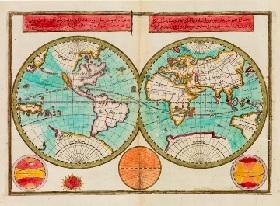Using AI to control energy for indoor agriculture
30 September 2024
Published online 6 July 2010

The Royal Society, the world's oldest scientific academy, is leading a cross-cultural effort to survey the state of science in the 57 states of the Organization of Islamic Countries (OIC). It will publish its findings in a series of national case reports over the next two years.
The 4 million USD project, called the Atlas of Islamic-World Science & Innovation, entails matching a local expert from an OIC member country with an international scientist. They will work together to compile all available national data, including the impact of research publications, the percentage of GDP spent on research and a profile of the education system.
The open access reports will also rank universities and institutes in the OIC, which do not qualify for global charts. It is hoped that this listing will prompt universities to strive to be the best, thereby helping narrow the gap in science between the West and Islamic countries.
Across countries of the OIC, a region that stretches from Africa to Asia, investment in research and development averages at 0.38% of GDP – which is well below the global average of 1.7%. In 2005, 17 Arabic-speaking countries published fewer scientific papers than Harvard University alone: 13,444 compared to 15,455
"The reports are one element. We're also trying to create a sense of momentum to take forward ideas and networks that come about from the research," said Natalie Day of the Royal Society's Centre for Research Policy.
These [Atlas] connections provide a platform to reach across cultural divides, which has the power to build trust.
Studies are underway in Egypt, Qatar and Jordan, amongst other countries of the OIC. These involve the Royal Society and Western academics working in partnership with local institutions, including Qatar Foundation in Qatar, the Princess Sumaya University of Technology in Jordan and the Bibliotheca Alexandrina in Egypt.
"We don't want reports that gather dust in a vault somewhere. This will involve institutions working with the project team and will hopefully spur capacity building," Ehsan Masood, author of the book Science and Islam, told those gathered last week to celebrate the project's launch at the Royal Society in London.
The idea was first conceived in 2006 when Natalie Day and James Wilsdon, read a special news report in Nature on science in Islamic countries. Both were based at Demos, a think tank that released a series of reports called Atlas of Ideas, which assessed the prospects of science and innovation in India, China and Brazil. In 2007, Day and Wilsdon moved to the Royal society and brought the idea of the Atlas with them. It has since gathered momentum with the support of Western organizations and a host of OIC-based institutions.
"Often the process is more important than the product," said Masood, who is also involved in the design of the project. "We didn't want experts flying in and going home, but working together with local experts.
"One important factor is trust and this project aims to address the decline in trust between the two cultures, a factor that influences how scientists work together".
"The only way to tackle this is to build a space for dialogue, and these [Atlas] connections provide a platform to reach across cultural divides, which has the power to build trust", says Martin Davidson of the British Council, a UK public body charged with developing cross-cultural links, which is collaborating in Atlas.
The first report, due for publication in October this year, will cover Malaysia. The series is aimed at a wide audience – including scientists and government officials – and will be written in an easily accessible style. It will be quickly followed by the Pakistan report in December and then Egypt's edition in March next year.
"The idea is not top-down, but to get scientists colliding with each other", said Bruce Alberts, editor-in-chief of Science and one of three envoys deployed by Obama to strengthen ties between scientists in the US and Islamic countries. "This is an exciting prospect to really make a difference".
doi:10.1038/nmiddleeast.2010.172
Stay connected: